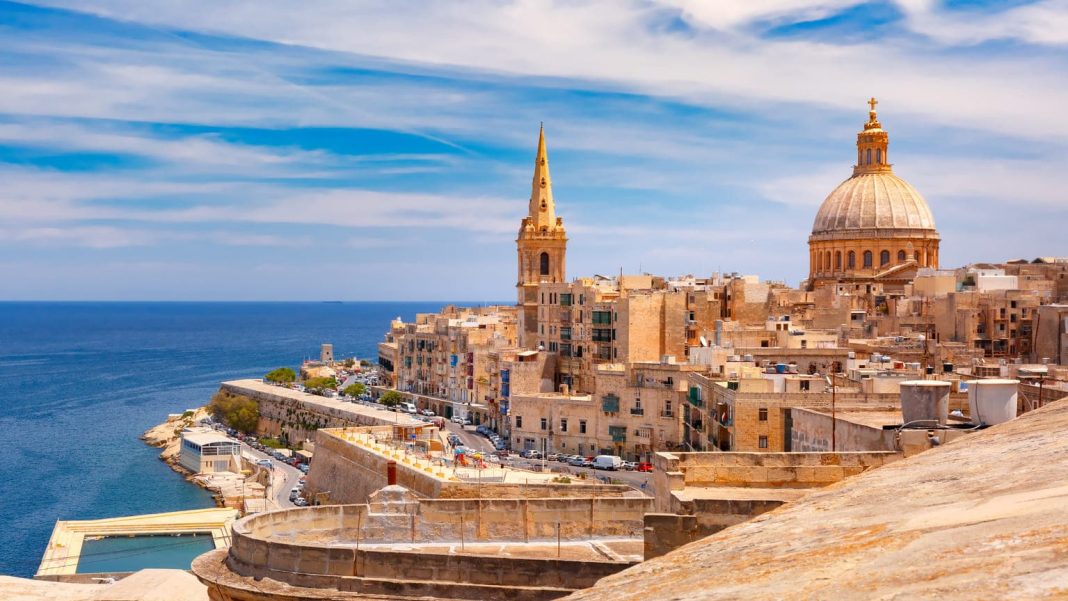Since the start of Russia’s full-scale aggression against Ukraine, the European Union countries have unanimously supported the idea of imposing tough sanctions against Russia. In particular, for citizens of the Russian Federation, any opportunities for obtaining citizenship of the EU member states, a residence permit, or even the provision of tourist visas were maximally restricted.
Malta is the only European Union country still offering the Individual Investor Program (IIP), better known as the Golden Passport. According to the Passport Index 2023 Passport Power Ranking, the Maltese passport is ranked 5th globally, sharing this position with the passports of Singapore and Slovakia. Approximately a quarter of all holders of Malta’s “golden passport” are from the former Soviet Union countries, although we are talking about Russia in the first place.
In this article, Ascolta analyses the situation of granting European citizenship under the conditional “golden passport” system and also tries to determine whether individual EU members bypass the sanctions restrictions and continue cooperating with Russian citizens.
This Content Is Only For Subscribers
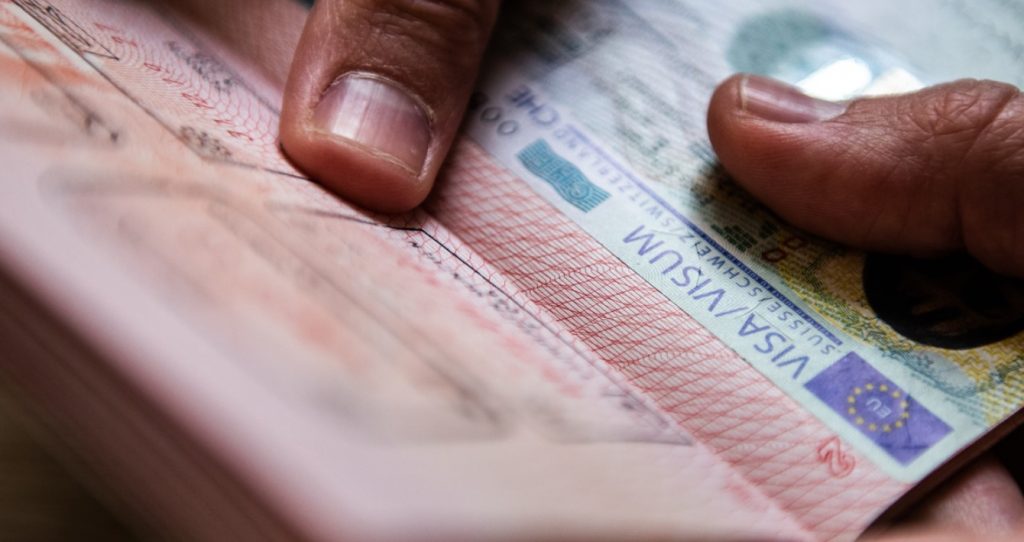
On September 9, 2022, the Council of the European Union, as part of another package of sanctions, ultimately suspended the visa facilitation agreement between the European Union and Russia. Thus, trips to the EU have become more complex and costly for Russian tourists.
Already on September 19, Poland, Latvia, Lithuania and Estonia proposed to introduce a complete ban on the issuance of visas. According to them, in the current circumstances, Russian tourists should not be allowed to visit Europe without any restrictions. This proposal did not receive unanimous support from other EU members. Still, the Baltic countries, which initiated such a ban, became the first European Union states to introduce enhanced control over the entry of Russian citizens into the EU. Sometime later, Finland closed the land border for tourists from Russia. The Ministry of Foreign Affairs of the country said that from September 30, 2022, restrictions will be introduced on the entry of Russians on the eastern border.
Further, other countries of the European Union followed. And although a complete ban on entry for Russian tourists throughout the EU has not been introduced, many countries have suspended the issuance of all types of Schengen visas, instead of which they issue only visas for humanitarian purposes or long-term visas for students, employees of European companies, as well as under the family reunification program.
At the same time, according to official data, from the beginning of Russia’s full-scale invasion of Ukraine to the imposition of severe restrictions by the European Union (from February 24 to September 30, 2022), 1.36 million Russian citizens legally entered the territory of the European Union.
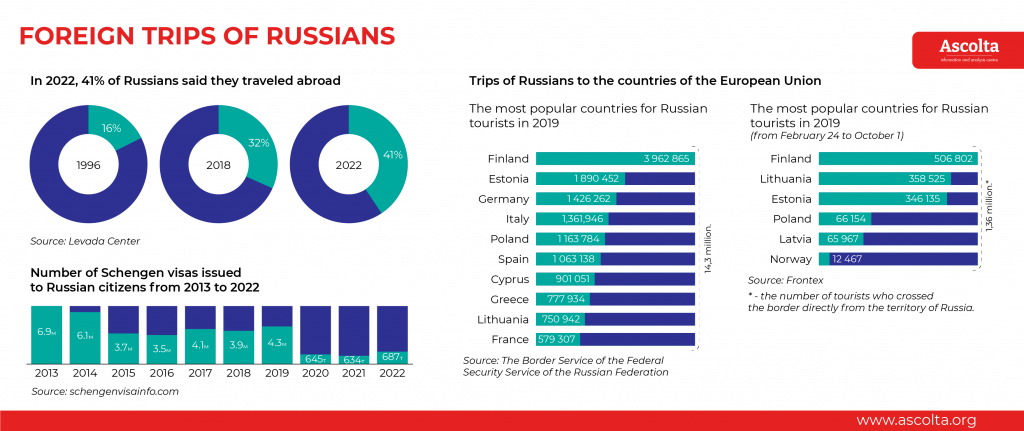
“Golden Passports” for big investors
At the same time, over the years, Russians have obtained Schengen visas to visit the European Union and legally acquired citizenship in some states, which greatly expanded their rights and opportunities. Countries such as Portugal, Montenegro, Cyprus and Malta offered the Individual Investor Program (IIP), better known as the “golden passport”: citizenship by investing in the country’s economy. Under the same program, acquiring a residence permit in Portugal, Switzerland, Italy, Greece, Austria, the United Kingdom, Bulgaria, and other EU states was possible.
The high cost of such services made it possible to regulate the market and grant citizenship only to very wealthy clients. The price range of investments for obtaining a residence permit in one of the European Union countries varied from EUR 60 thousand (residence permit in Latvia) to GBP 2 million (residence permit in the UK). Getting full citizenship was much more expensive.
At the same time, such services were in the greatest demand in the Middle East and Asia countries as well as Russia. The European countries that provide the Golden Passport service do not disclose complete information on the number of issued passports. At the same time, data from open sources show that more than 8 thousand people used this option.
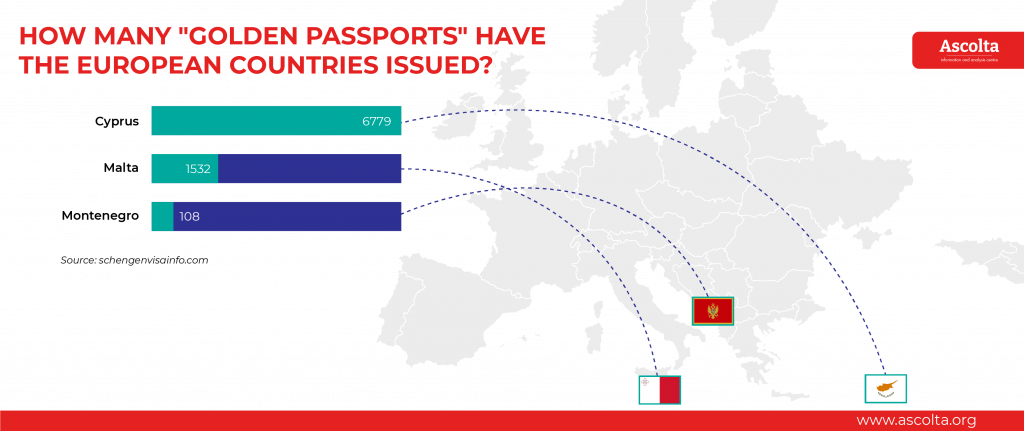
Among the holders of the “golden passports” of the European countries, there are many Russian oligarchs and politicians, as well as members of their families. It is reliably known that Russian billionaires Alexander Ponomarenko, Vadim Moshkovich, Mikhail Gutseriev and Alexei Kuzmichev obtained citizenship in Cyprus (in 2022, Cyprus officially announced the start of the procedure for depriving them of citizenship, but data on the cancellation of passports were never provided).
Among the most famous holders of the “golden passports” of Montenegro are: the son-in-law and daughter of the deputy presidential envoy in the North-Western Federal District, Lyubov Sovershaeva, Albert Beyneshev, the son of an entrepreneur who was shot dead in St. Petersburg in the 90s, Sergey Studennikov, owner of the Krasnoye & Beloe network, a former adviser to the head of the Accounts Chamber, and now CEO of the Igronik company Nikita Pipko, as well as the founder of Ethereum Vitaly Buterin.
The founder and co-owner of the manufacturer of roofing materials TechnoNIKOL Sergey Kolesnikov (a billionaire from the Forbes list), the founder and co-owner of the Internet company Yandex Arkady Volozh, the son of the ex-president of Rosneft Sergey Bogdanchikov, owner of an investment and development company Boris Mints, one of the largest Russian landowners Igor Khudokormov, Alfa-Bank CEO and Deputy Chairman of the Board Alexei Marey managed to get Maltese passports.
European Commission intervention and tightening of rules
Since 2019, the European Union has been fighting against “golden passports” and other schemes for granting citizenship in exchange for investment. At the same time, the key countries trading citizenship for investment (Cyprus and Malta) tried to maintain a very profitable business in every possible way. Moreover, in 2020, the authorities of Montenegro announced the launch of a similar program.
In the fall of 2020, the Qatari TV channel Al Jazeera published the Cyprus Papers investigation, the heroes of which were some high-ranking Cyprus officials. In this investigation, the journalists acted as representatives of a Chinese investor who was allegedly convicted in China for money laundering and needed to obtain Cypriot citizenship urgently. In response, Cypriot lawyers and officials stated that this was not a problem if the client was willing to pay money. A month after this investigation’s publication, the Cypriot government’s official representative, Kyriakos Kousios, announced the decision of the country’s parliament to suspend the Golden Passport program. In 2021, the European Commission brought a case against Cyprus and Bulgaria to court based on allegations of trafficking in citizenship and residence permits.
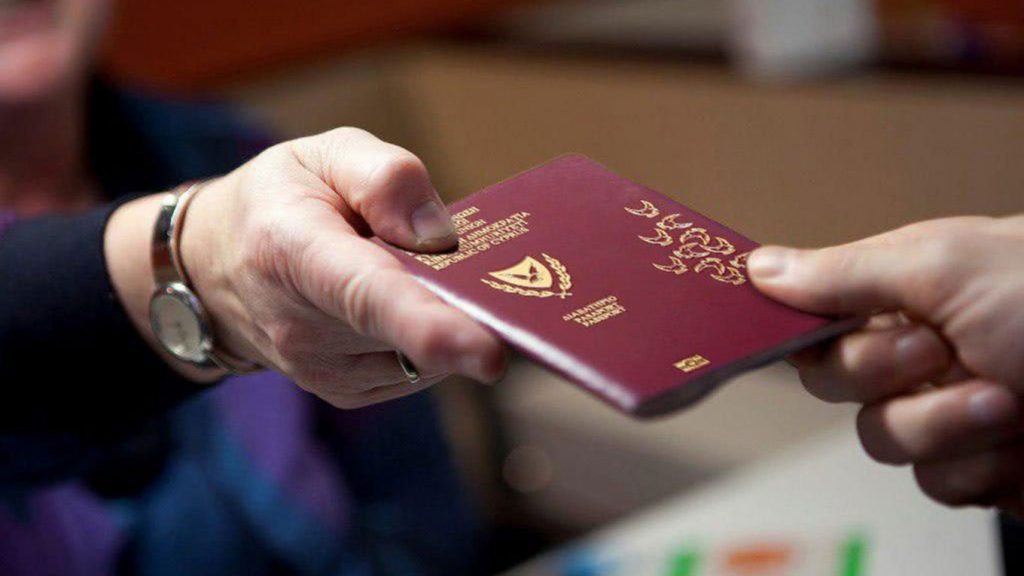
Following Cyprus, Malta also faced corruption scandals due to the sale of citizenship. In April 2021, a joint investigation was published by the Daphne Caruana Galizia Foundation, The Guardian, Dossier Center and five independent Maltese media organisations: Lovin Malta, Malta Today, The Malta Independent, The Times of Malta and The Shift. The investigation presented documents from the international company Henley & Partners, which was the main lobbyist for the Golden Passport program.
According to published figures, on September 10, 2013, Prime Minister Joseph Muscat approved a scheme to purchase Maltese passports for individuals. He signed a document creating a new government agency, Identity Malta, which included all departments responsible for passports, identity cards, work permits and residence permits. Three days later, his government signed an agreement with Henley & Partners Holdings to implement a passport sales program. Henley & Partners, which registered its Maltese branch office a year before signing an agreement with the Maltese government, has become the sole concessionaire of Maltese passports, which provide all the rights of a citizen of the European Union.
The leak of internal documents from Henley & Partners showed a large number of violations regarding the granting of Maltese citizenship. The European Commission was also interested in this investigation, which was another reason for closing the Golden Passport program. However, despite the start of official proceedings, Identity Malta continued to accept applications for citizenship by investment.
Russian citizens are among the leaders among buyers of Maltese passports
Malta does not disclose the identity of applicants for citizenship under the Individual Investor Program (IIP). At the same time, according to data obtained from Henley & Partners internal information leak, it is known that the largest number of applicants for Maltese citizenship are Russian citizens – 37%. In second place is China, with approximately 12% of all applicants, followed by Saudi Arabia, with approximately 10% of all applicants.
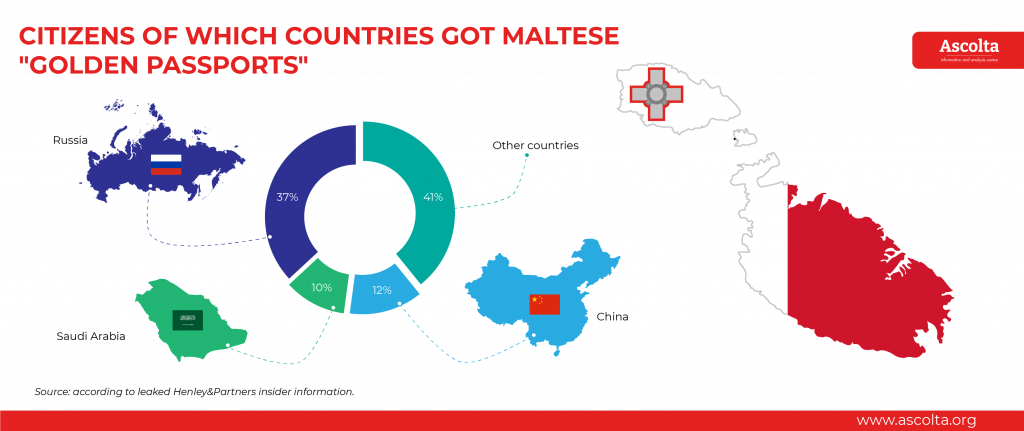
The Passport papers project published information about only a few Russian oligarchs who have received or tried to obtain Maltese citizenship. So, according to published data, in 2014, the Russian oligarch and the largest shareholder of the Alfa Group investment company, Mikhail Fridman, applied for the purchase of a Maltese passport. The application also listed his two children and wife. In a cover letter, Friedman said he intended to spend time in Malta with his family during his holiday and hoped to “bring existing banking relationships with Maltese financial institutions to an advanced level.”
Also, in 2014, Pavel Grachev, the CEO of Polyus Gold, the largest gold producer in Russia and one of the world’s largest gold mining companies, tried to obtain Maltese citizenship. Investigators draw attention to the fact that during the application process, Identity Malta asked Grachev to explain his relationship with Suleiman Kerimov, a Russian oligarch under US sanctions. Kerimov’s son, Said Kerimov, formally owned a controlling stake in Polyus Gold. In response to Identity Malta’s assertion that the “last decade” of Grachev’s career depended on ties to companies owned or partially owned by Kerimov, Grachev stated that he had only “very rarely spoken personally to Suleiman Kerimov”. It is authentically known that Pavel Grachev and his family received Maltese passports in 2017.
Also, the Passport Papers project published evidence of the acquisition of citizenship of Malta by Russian entrepreneurs Pavel Melnikov, Roman Trushev and Vadim Vasiliev.
In April 2021, the Dossier project, owned by the Russian “oppositionist” Mikhail Khodorkovsky, published an investigation entitled “The Maltese Roots of Russia’s Richest Deputies”. The printed article presented evidence of the citizenship of Malta in the richest deputy of the state council of Tatarstan, Irek Salikhov, as well as the wife and son of the deputy of the State Duma of the Russian Federation, Grigory Anikeev.
In January 2021, a billionaire from the Forbes list, founder and co-owner of the manufacturer of roofing materials TechnoNIKOL, Sergey Kolesnikov, personally confirmed to the Russian media that he had a Maltese passport: “Today I already have enterprises in four European countries; I don’t plan to stop there, the new passport allows you to save time on travel and expand the geography of visa-free entry countries.”
Notably, the scheme for granting citizenship of Malta to citizens of Russia and Belarus officially worked until 2022. Already after the start of Russia’s full-scale invasion of the territory of Ukraine, local authorities announced that they would no longer issue “golden passports” to citizens of the Russian Federation and Belarus. With a similar requirement, the European Commission addressed the local authorities back in 2020.
The same program of “golden passports” currently operates in Malta. The country’s government said that it does not contradict the legislation of the European Union and is hugely beneficial in terms of attracting additional investment. In response, on September 29, 2022, the European Commission sued Malta over the ongoing Golden Passport program.
“The Commission considers that the granting of EU citizenship in exchange for predetermined payments or investments without any real connection with the Member State concerned is incompatible with the principle of sincere cooperation enshrined in Article 4(3) of the Treaty on European Union and with the notion of Union citizenship as provided for in Article 20 of the Treaty on the Functioning of the European Union,” the EC communique reads.
Can Russian citizens obtain a Maltese passport after the Russian-Ukrainian war started?
According to data from the Government of Malta, in 2022, 339 people acquired Maltese citizenship through naturalisation. 284 men and 55 women received Maltese passports. During the reporting period, local authorities deprived no one of citizenship. The authorities did not share specific data on the nationalities of recipients of Maltese citizenship during the reporting period. But representatives of the relevant department reported that the list of countries of origin of newly naturalised citizens included the following jurisdictions: Ukraine, Russia, Palestine, and Israel.
Of course, these figures may cover the period of time before the start of a full-scale Russian invasion of Ukraine and the introduction of tough European Union sanctions against Moscow. At the same time, several aspects indicate that Malta can bypass the bans and allow Russian citizens to the “golden passports” program.
Currently, you can find many offers to obtain a “golden passport” from intermediary companies on the Internet. Many are located in the Middle East, while a few claim to have offices in Moscow.
On the website of such companies, it is proposed to receive citizenship and a residence permit in the EU countries. Many resources indicate that the receipt of “golden passports” of Malta for citizens of the Russian Federation is temporarily suspended. Still, at the same time, it is suggested to contact the manager for more detailed information.
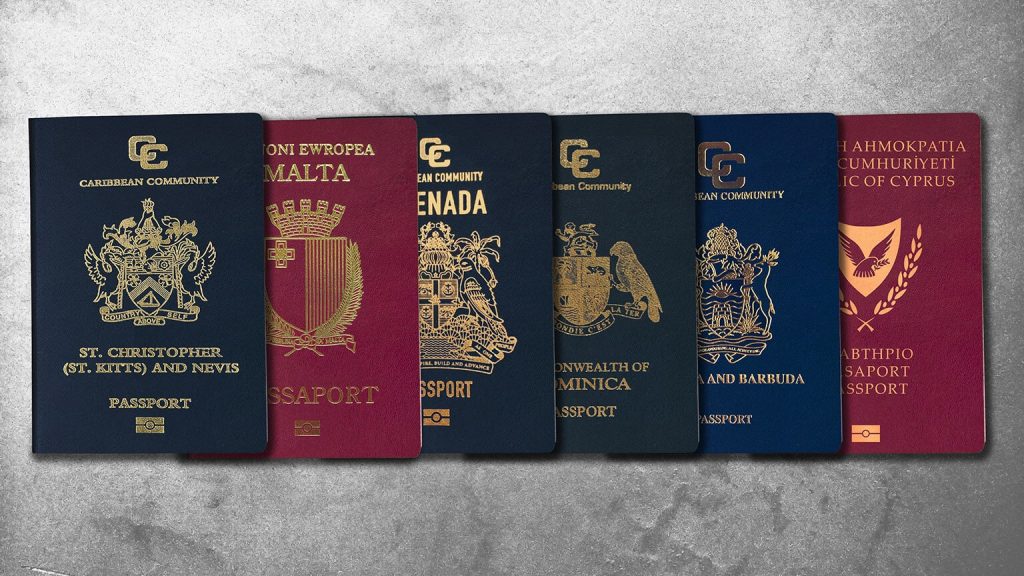
Ascolta spoke with a representative of one of these companies, whose offices are located in Moscow and the United Arab Emirates, and learned several interesting nuances. They demonstrate the availability of opportunities for Russian citizens to get almost unlimited opportunities to visit the European Union and even conduct legal business in it.
Thus, a company representative focusing on accompanying clients in obtaining “golden passports” notes that such services are closed for Russian citizens, and European companies flatly refuse to accept such applications. At the same time, most EU states accept applications for obtaining a residence permit, which will allow you to get almost the same opportunities as with a passport: a bank account, unlimited stay in the country, unhindered visits to other Schengen countries and more. It is noted that a biased attitude towards Russian citizens can only be encountered when applying for a residence permit in the representations of the Baltic countries and Poland. Still, there are no particular problems here either. Other European Union countries do not pay attention to the factor of the Russian passport at all: “They are subject to a standard procedure that does not require additional checks. The more western the country [of Europe] is, the easier it is to treat this,” our interlocutor notes.
At the same time, obtaining a residence permit opens up the possibility of getting citizenship in this country, subject to residence in it for a certain time. Maltese legislation, in this case, is the most comfortable: after 5-7 years, you can become a full-fledged citizen of a European state. True, the main condition is permanent residence in the country. Although, this condition, as has been repeatedly mentioned above, is easily bypassed thanks to well-established corruption schemes with the participation of local authorities. The same information is confirmed by our interlocutor, according to whom support in this matter starts from EUR 50 thousand.
Our interlocutor also notes that many Russians use a more economical option by buying Turkish citizenship. The legislation of this country allows you to get a passport for investing in real estate, moreover, without conditions at a minimum cost. At the same time, a Turkish passport allows you to visit the countries of the European Union freely, and you can open an account in Turkish banks for further use, bypassing sanctions. In fact, with this option, a person buys real estate, which he can later sell, and the services of intermediaries cost $5-15 thousand.
In general, Ascolta’s interlocutor notes that if a Russian citizen wants to obtain a residence permit in one of the European countries and conduct business there (respectively, open a bank account), then there are no problems with this. The preliminary condition is not to be under personal sanctions. At the same time, as of June 2023, Malta remains the most requested country and offers the most comfortable conditions.
Who is lobbying for “golden passports” within the system?
In June 2023, Ukrainian journalist Tatyana Nikolaenko published an investigation indicating that some Russian oligarchs were still negotiating to obtain Maltese citizenship.
The investigation notes that this program was led by Jonathan Cardona, a close friend and associate of Christopher Fearne, Vice Prime Minister and Minister of Health of Malta, for several years. Firne’s political career began in 2014. From April 1 2014, to April 28 2016, Fearne was the Parliamentary Secretary for Health in the office of Minister of Energy and Health Conrad Mizzi. Mizzi became the actual subject of the Panama papers and became so famous for the corruption stories that in December 2021, the US government publicly banned him from entering the country for his involvement in a corruption scheme that resulted in the award of a government contract for the construction of a power plant and related services in exchange for bribes and illegal enrichment.
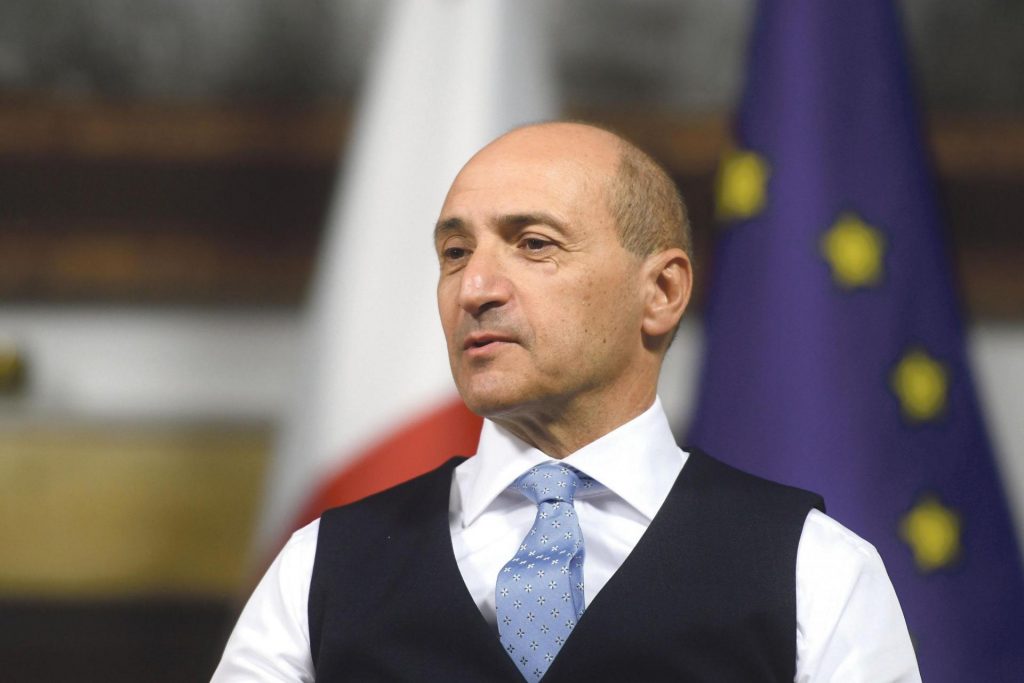
But this did not stop Christopher Fearne from moving to the team of the Prime Minister of Malta, Joseph Muscat, who is the main ideologist and lobbyist of the Golden Passport program. Fearne was Deputy Prime Minister from July 2017 until his resignation in January 2020. But even after the resignation of Muscat, Fearne received the post of Minister of Health in the government of Robert Abel. The investigation also confirms the connection of Christopher Fearne with his chief of staff, Carmen Siantar, and her daughter Celine Siantar.
The author of the investigation also points out that Fearne personally negotiated the granting of Maltese citizenship to Leonid Levitin, the brother of the ex-Minister of Transport and current assistant to the President of the Russian Federation, Igor Levitin. It is noteworthy that the document published in the investigation also indicates the data, apparently, of the wife of Leonid Levitin, Nadezhda, and their daughter Alexandra. This information dates back to 2019, although the investigation itself is positioned as another confirmation that Russian oligarchs were granted citizenship of Malta after the start of a full-scale invasion.
At the same time, the most important is that Fernet remains in the position of the Minister of Health of Malta, and the scheme provides “golden passports” to Russian citizens. However, it does not have direct evidence, based on indirect facts, and still continues to function.
Considering the growing excitement around the issue of the functioning of the service for the provision of “golden passports”, as well as the presence of reliably unconfirmed information about the existence of loopholes for Russian citizens, the question arises of the reliability of the internal system of the European Union for monitoring the implementation of sanctions and restrictions against the aggressor state.
The answer to this question should be provided by representatives of the European Commission, who are currently already pursuing legal proceedings against Malta.
In turn, the Ascolta team sent an appeal to the European Commission and the ambassadors of the European Union, in which they reiterated all the facts of a possible violation of the sanctions policy by individual members of the European Union. We will inform our readers about the result of the request in the following materials.

